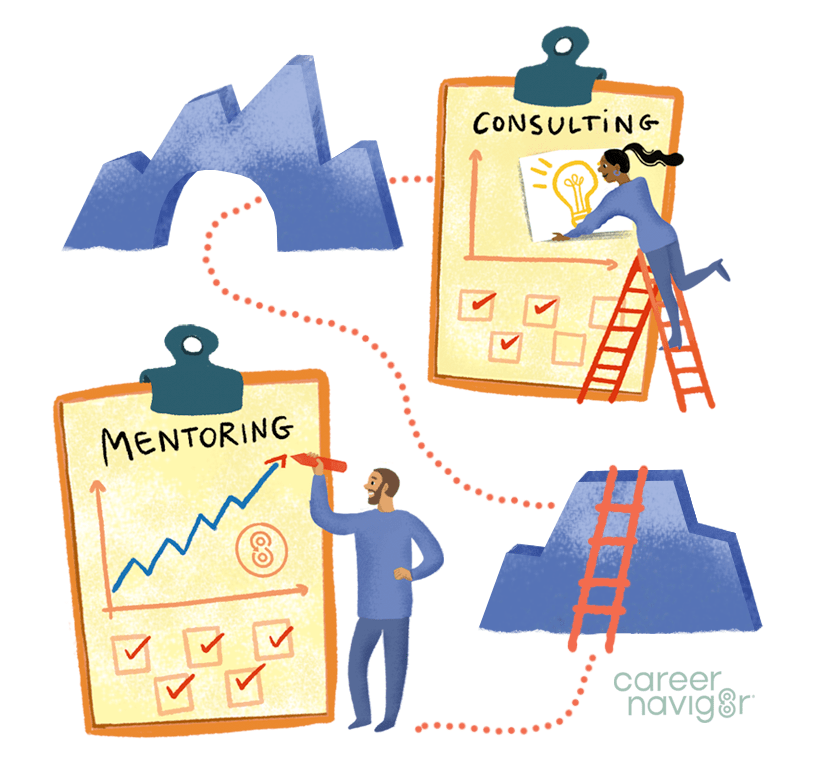Mentoring Vs. Consulting – 5 Key Differences You Need to Know

Looking for professional guidance on the next step in your career? If so, then you’re going to have to understand the differences between mentoring and consulting.
Mentoring and consulting are often pitched as being one and the same, but they’re actually very different in practice. From the required skill set right through to the end result, the two can have a drastically different effect over what you learn and how you progress in your career. That’s why we’ve put together this list of the five key mentoring and consulting differences and how you can decide which one is right for you.
1. The Basics of Mentoring and Consulting

Let’s start simple. Mentoring and consulting are both forms of career advice given by experienced professionals to young up-and-comers but that’s where the similarities end.
Mentoring is a long-term process during which the Mentee and the Mentor have regular meetings to discuss progress and plan ahead. Consulting, on the other hand, tends to be more stand-alone with a focus on specific problems and solutions. To put it another way, consulting is about solving your problems while mentoring is about teaching you the skills to solve them yourself.
2. Personalised Guidance Vs. Professional Advice
While you may have a long-term working relationship with a consultant, their focus is always going to be more short term than a Mentor. Let’s take a look at an example:
Jenny is a manager for a small graphic design company who are looking to broaden their client base. They’ve recently taken on several new clients in industries they’re less familiar with. In this situation, Jenny might want to consult with another graphic designer who has worked in those industries for advice about general trends and the best overall approach to this problem.
Alternatively, Jenny might consult her Mentor about the company’s long-term strategy and how she can best use her existing skill set to transform them into the company they want to be.
The key here is not just the timescale itself but the style of advice. A consultant is best placed to give information about what they do on a day-to-day basis whereas a Mentor can give advice about what’s right for you.
3. Career Development Vs. Problem Solving
There’s no doubt about it – expert problem solvers are useful. Sometimes you’re blocked on a problem and all you want is for someone to come along and fix what’s broken so you can carry on with the important stuff.
Unfortunately, consultants can also be a double-edged blade. The more you rely on them to solve your problems, the less you grow.
You have to remember that a consultant isn’t there to help you develop. They’ve been hired to fix your problems and while they’ll likely do a top-notch job of that, they’re less likely to explain what went wrong in the first place.
After all, why should they? If they solve all your problems then that just means less work for them?
A mentor, on the other hand, is incentivised to help you grow. They aren’t here to do the work for you but to teach you how to do the work which, at the end of the day, is far more valuable.
4. Long-term Growth Vs. Ad Hoc Solutions/Quick Fixes
But why is long-term growth so much more valuable than short-term solutions? After all, if you can just pay someone to fix your problems for you then doesn’t that save you lots of time and effort in the long run?
The problem with these kinds of short-term solutions is that they’re just that – short term. It’s like curing a symptom without diagnosing the illness.
The more you come to rely on quick-fixes, the more problems you’ll have that need fixing.
5. Mentoring Vs. Consulting – How is Success Measured?
Okay, it’s time to be blunt. For some people, a job is just a job. It’s not always about becoming a better version of yourself or learning skills that will help you in day to day life. For some it’s just about earning a crust and that’s fine.
It’s always okay to consult an expert.
That being said, here at Career Navig8r we want to inspire people to go further. We truly believe that a career doesn’t have to just be about putting food on the table. We believe that, with the right guidance, everyone can have a fulfilling career that pushes them to learn and grow.
To put it simply, instead of consulting an expert, why not become the expert yourself?
Chasing Professional Growth and Development
Ultimately, the difference between consulting and mentoring is all about how much you value professional growth.
While consulting certainly has its place, here at Career Navig8r we’re about mentoring all the way. Through mentoring, you can get the inside perspective on your future job role and learn/develop in ways you never would from a more surface level approach.
Kickstart your career today by signing up to become a Mentor with Career Navig8r!


